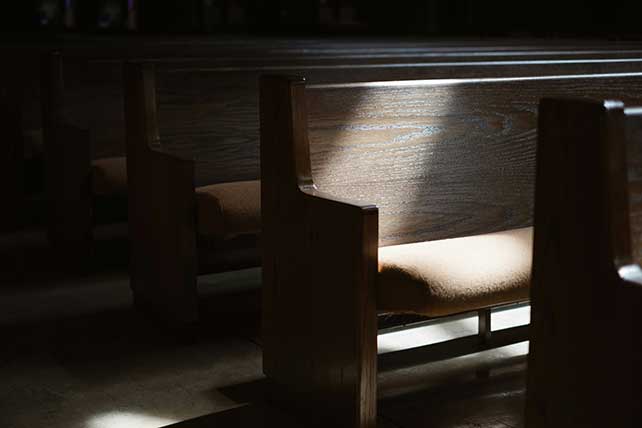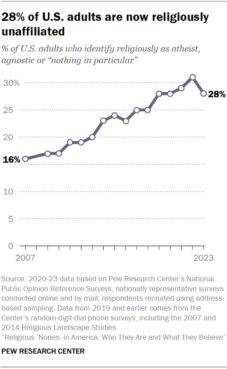(RNS) — America’s religiously unaffiliated, or “nones,” are largely defined by what they are not, rather than what they are. So as they’ve multiplied, it’s perhaps unsurprising that they’ve also been shrouded in myths and misconceptions.
They’ve sometimes been pegged as a group that’s wholly secular and hostile to religion, or conversely as a cohort that has uniformly adopted spirituality rather than religion. They’ve also been characterized as morally directionless or civically disengaged.
A new Pew Research Center report on America’s nones shows the truth is more complicated.
“Just like there’s many differences among religious people, turns out there are many differences among non-religious people, too,” said John Green, professor emeritus of political science at The University of Akron and an adviser on this study. “And I think this report adds some real substance to that.”
RELATED: Survey: White Mainline Protestants Outnumber White Evangelicals, While ‘Nones’ Shrink
In fact, sociologist Ryan Cragun suggests that the report shows America’s nones aren’t much different from the rest of the American public — at least not anymore.
“28% of U.S. adults are now religiously unaffiliated” (Graphic courtesy Pew Reseach Center)
“In the 1980s, the nones actually looked pretty different. They were small, they were 5 to 7% of the U.S. population, disproportionately male, disproportionately white, very young. Not likely to be married. Highly educated, pretty high incomes,” said Cragun, a professor at the University of Tampa who is also an adviser on this study. “Today, the nones kind of look like everybody else.”
“At some level, we’re saying, hey, actually, this is just your neighbor,” he added.
Pew’s findings, which come from a survey of 11,201 respondents conducted in the summer of 2023, show that, at 28%, a 12 percentage point increase since 2007, the religiously unaffiliated cohort now makes up a sizable portion of the U.S. population. They’re also still leaning young and democratic, with 69% under the age of 50 and 62% of nones identifying as Democrats or leaning toward the Democratic Party. But in contrast to where they were 40 years ago, today’s religiously unaffiliated are roughly split between men and women, and their racial makeup broadly mirrors that of the general population.
Pew’s study shows many nones do believe in something, even if it doesn’t fall into traditional religious categories. While 20% say they are agnostic and 17% identify as atheist, the majority of nones (63%) fall into the more ambiguous “nothing in particular” category. And though only 13% say they believe in the God of the Bible, more than half (56%) say they believe in some other higher power.
“There can be a temptation to assume that all religious nones are non believers … that they must all have secular worldviews,” said Greg Smith, associate director of religion research at Pew and the primary researcher for this study. “And this report shows that’s not really true.”


